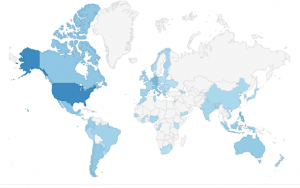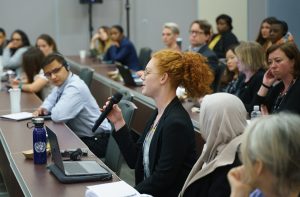What We Heard from the OGP Standards Consultation
In 2021, OGP presented the latest iteration of the OGP Participation & Co-creation Standards to the OGP global community. Designed to foster ambitionAccording to OGP’s Articles of Governance, OGP commitments should “stretch government practice beyond its current baseline with respect to key areas of open government.” Ambition captures the po... and clearly outline the minimum requirementsAll OGP participating countries are expected to adhere to the Participation and Co-Creation Standards. Each Standard includes clear and measurable minimum requirements that all OGP participating count... that will be expected from all OGP members, the updated Standards seek to simplify, clarify, and streamline the original process. To do this, OGP consolidated the existing 60 standards into a set of 5 new Standards that address the key aspects for robust OGP participation, and that are underpinned by overarching principles of transparencyAccording to OGP’s Articles of Governance, transparency occurs when “government-held information (including on activities and decisions) is open, comprehensive, timely, freely available to the pub... More, inclusionOGP participating governments are working to create governments that truly serve all people. Commitments in this area may address persons with disabilities, women and girls, lesbian, gay, bisexual, tr... More, participation, accountability and innovation and ambition.
Following consultations with the OGP Criteria & Standards subcommittee, full Steering Committee, and global community, we turned back to the community to help us finalize the Standards, by reviewing the new proposal and making comments and suggestions for improvement on an online platform. Each Standard was available for comment, as well as the action plan length and delivery windows. Community comments were publicly available for the rest of the community to view and interact with. Read this blog for more details about how we reached the final version of the Standards, and the platform used for consultations.
The community response was robust and diverse. In the four weeks the Standards were available for public comments, the platform received over 450 visits from 35+ countries, a testament to the engagement of the vibrant global OGP community. Of those visits, we were pleased to receive 51 comments from government, civil society, multilateral/partners, academia, and other stakeholders.

Countries that participated in the consultation. Credit: Open Government PartnershipThe Open Government Partnership (OGP) is a multi-stakeholder initiative focused on improving government transparency, ensuring opportunities for citizen participation in public matters, and strengthen... More via Google Analytics
The comments can broadly be grouped into three main categories:
- Suggestions to raise the minimum requirements and/or increase ambition
Many of the comments received referred to raising minimum requirements, particularly the number of multi-stakeholder forum meetings. The minimum standards were carefully calibrated to reflect the key variables that evidence has shown leads to more ambition or better completion. The minimum requirements should not be seen as the goal, but rather as a starting point. Flexibility will then allow countries to approach their processes in a manner that works for their context. For instance, monthly multi-stakeholder forumRegular dialogue between government and civil society is a core element of OGP participation. It builds trust, promotes joint problem-solving, and empowers civil society to influence the design, imple... meetings might work in certain contexts, but could be too onerous for both government and civil society in others. Therefore, these suggestions were not included in the new Standards. - Suggestions to be covered on the guidance materials
There were also several suggestions to make the items in the “guidelines” section of each Standard mandatory. Based on these comments, the section was renamed to “approaches” to clarify that these items are not requirements, but rather illustrative examples of different ways that countries could approach their process. The comments received were also incorporated into two new approaches and improvements to three others; the modified and added text is available at the end of this text.
- Other general recommendations or questions
We received a large number of other comments, from showing general support for the new Standards, especially the allowance for flexibility in selecting a 2 or 4 year action planAction plans are at the core of a government’s participation in OGP. They are the product of a co-creation process in which government and civil society jointly develop commitments to open governmen..., to sharing specific experiences about how things are done in different countries. Each comment was reviewed and given an individual response.
To see the entire list of responses given to all the comments received, please see the published reasoned response database.
OGP is nearly finished with this process. The Criteria and Standards subcommittee has reviewed and endorsed the revised version of the standards, which is available here. The full Steering Committee has been asked to provide final approval by November 24, with the Standards officially launching at the OGP Global Summit. At the same time, OGP is working hard to develop guidance materials – expected to launch in early 2022 – so that they will be ready for use with the plans that will begin co-creation early next year.
We thank the OGP community for its valuable insight and participation in this global consultation process as we continue to strive for clear and ambitious participation and co-creation standardsCollaboration between government, civil society and other stakeholders is at the heart of the OGP process. The Participation and Co-Creation Standards are intended to support this collaboration throug....
—
Additions and edits to the “approaches” section of each standard based on comments received during the global consultation:
Standard 1:
- The government point of contact, in consultation with civil society, defines and coordinates participation of other government actors in the MSF/platform. (new)
Standard 2:
-
- Relevant information on the OGP process is published on the OGP website/webpage, including but not limited to information about leading and participating government agencies, contact information, OGP processes and opportunities for participation, meeting agendas and minutes, and all other relevant documents.
- The government publishes information and documents in non-technical language that is understandable to the widest possible extent of the general population, using relevant online and offline engagement tools.
- The government, where relevant, publishes information related to process and commitmentOGP commitments are promises for reform co-created by governments and civil society and submitted as part of an action plan. Commitments typically include a description of the problem, concrete action... completionImplementers must follow through on their commitments for them to achieve impact. For each commitment, OGP’s Independent Reporting Mechanism (IRM) evaluates the degree to which the activities outlin... More in machine readable, reusable, open formats that are freely available. (new)
Standard 5:
- The MSF where established, or the government where there is no MSF, holds open meetings with implementing agencies to provide updates on commitment completion and listen and respond to civil society and other stakeholder inputs. (new)
No comments yet
Related Content
 Challenges and Solutions
Challenges and Solutions
10 Lessons from 10 Years of OGP
OGP Deputy CEO Joe Powell shares reflections on how OGP’s experience can inform some of the most critical policy debates facing the world today.
 Challenges and Solutions
Challenges and Solutions
Help Us Finalize the OGP Co-Creation and Participation Standards

One Month to Make 2021 Democracy and Open Government Summits Count
With the OGP Global Summit and Summit for Democracy just around the corner, we share three steps for the open government community to take to ensure the events deliver concrete…


Leave a Reply